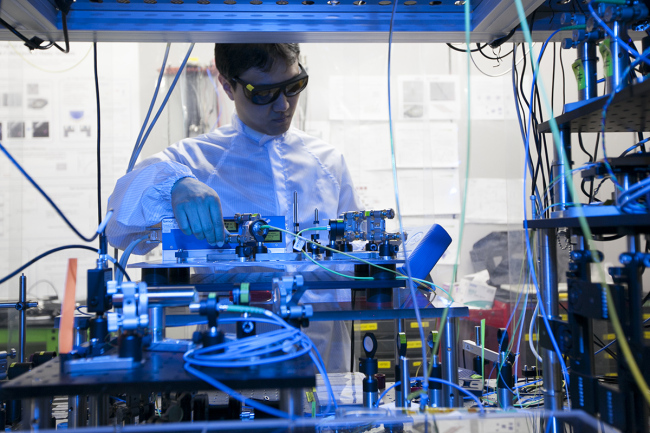Tech Brunch breaks down how complex technologies work. -- Ed.
Quantum cryptography, the science of utilizing quantum mechanics to perform cryptographic tasks, is rising as an essential data security technology to replace existing security solutions in the upcoming era of 5G network and Internet of Things.
In an interview with The Korea Herald last week, Cho Seok-beom, Ph.D manager at Quantum Tech. Lab of South Korean mobile carrier SK Telecom, said keys encrypted with photons are “highly sensitive, entangled with one another, so they are perfectly irreplicable.”
“In high-speed, mass data communications, the most important thing is to distribute a securely encrypted key to the receiver without any exposure during exchange,” Cho said.
 |
An SK Telecom engineer works on the development of quantum cryptographic technologies at the company‘s Quantum Tech. Lab in Bundang, Gyeonggi Province. (SK Telecom) |
“Quantum cryptography’s best-known quantum key distribution offers a secure solution to the possible exposure problem due to the unique characteristics of quantum superposition.”
Currently used public-key encryption made of digital bit 0 and 1 can only be broken by quantum algorithms in several seconds, the expert said.
Quantum keys are composed of superposed quantum bits that are unknown or undecided until the key is safely arrived.
If there is any external attempt to read the data encoded in a quantum state, such act changes the quantum state, failing the attempt.
“Because the quantum state is unknown, the key is perfectly irreplicable,” Cho underlined.
To produce a secure quantum key, it is also crucial to create a random bit sequence.
Currently, pseudo random number generators in the form of software are being used, but the complexity of the randomness is low.
A truly random number generator is needed to make a key sequence 100-percent random.
While many quantum cryptographic firms around the world are making efforts to develop a TRNG, SKT has developed a prototype of an ultra-small quantum random number generator chip that generates “almost truly random” bit sequences.
If the chips is embed to a wide variety of IoT products, including autonomous vehicles, drones and smart devices, it can enhance the level of security dramatically, the expert said.
The mobile carrier is also developing a QRNG in the form of USB and PCIe (Peripheral Component Interconnect Express). QRNG in the form of USB or PCIe can simply be connected to any product already on market to provide genuine randomness.
SKT has been investing in developing quantum cryptography since 2011 by establishing Quantum Tech. Lab as the first among Korean mobile carriers.
Most recently on Monday, SKT announced during the Mobile World Congress being held in Barcelona that it will acquire the world’s No.1 quantum cryptographic business based in Switzerland. The Swiss company acquired by SKT is IDQ that announced the world’s first QRNG in 2002 and launched the first quantum key distribution service in 2006.
“Based on the QKD technology, we are working to commercialize quantum repeaters that enable long-haul transmission of data in a secure manner,” Cho said.
The company announced last year it has developed a quantum repeater named “Trusted Repeater” that achieved a distance record of 112 kilometers breaking the previous record of 80 kilometers.
“Our ultimate goal is to achieve quantum network technologies that are really complex,” he said. “We will continue improving the Trusted Repeater to have more complicated nodes for stronger data security.”
By Song Su-hyun (
song@heraldcorp.com)








![[Today’s K-pop] Blackpink’s Jennie, Lisa invited to Coachella as solo acts](http://res.heraldm.com/phpwas/restmb_idxmake.php?idx=644&simg=/content/image/2024/11/21/20241121050099_0.jpg)